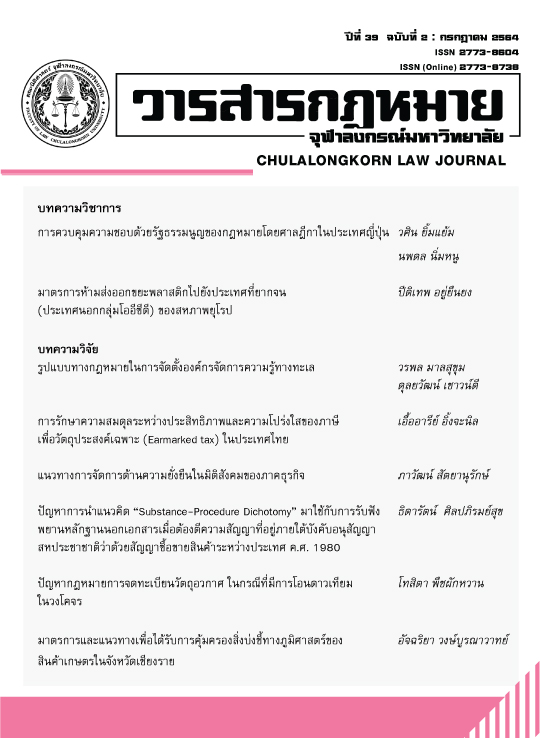ปัญหากฎหมายการจดทะเบียนวัตถุอวกาศ ในกรณีที่มีการโอนดาวเทียมในวงโคจร
Main Article Content
บทคัดย่อ
การดำเนินกิจกรรมอวกาศ ไม่เพียงแต่รัฐเท่านั้นที่สามารถดำเนินกิจกรรมอวกาศได้ แต่เอกชนและ
องค์การระหว่างประเทศก็สามารถดำเนินกิจกรรมอวกาศได้เช่นกัน ซึ่งได้ถูกรับรองไว้ในสนธิสัญญาอวกาศ
ค.ศ. 1967 จึงทำให้จำนวนของผู้ประกอบการกิจกรรมอวกาศเพิ่มมากขึ้น และความต้องการใช้บริการกิจกรรม
อวกาศโดยเฉพาะดาวเทียมเพิ่มมากขึ้น จึงทำให้การดำเนินกิจกรรมอวกาศเป็นไปในเชิงพาณิชย์และมีความซับซ้อน
มากขึ้น จะเห็นได้จากการซื้อขาย หรือเช่าดาวเทียมในขณะที่ปฏิบัติการอยู่ในวงโคจร ไม่ว่าจะเป็นการซื้อขาย
ระหว่างรัฐด้วยกัน หรือระหว่างรัฐกับเอกชนของรัฐอื่นหรือองค์การระหว่างประเทศก็ตาม ซึ่งยังไม่มีกฎหมาย
กำหนดเกี่ยวกับการโอนดาวเทียมในวงโคจรไว้โดยเฉพาะ จากกรณีที่เกิดขึ้นนั้นทำให้เห็นถึงประเด็นปัญหาของ
หลักกฎหมายระหว่างประเทศหลายประการ แต่ในบทความนี้ผู้เขียนมุ่งที่จะศึกษาเฉพาะกรณีปัญหาของหลัก
กฎหมายว่าด้วยการจดทะเบียนวัตถุอวกาศเท่านั้น อีกทั้ง ผู้เขียนจะนำเสนอถึงแนวทางในการแก้ไขปัญหาหลัก
กฎหมายที่เกิดขึ้นด้วย ทั้งในระดับระหว่างประเทศและระดับรัฐ
Article Details
ลิขสิทธิ์และเนื้อหาในเว็บไซต์ของวารสารกฎหมาย (รวมถึง โดยไม่จำกัดเฉพาะ เนื้อหา รหัสคอมพิวเตอร์ งานศิลป์ ภาพถ่าย รูปภาพ ดนตรีกรรม โสตทัศนวัสดุ) เป็นกรรมสิทธิ์ของวารสารกฎหมาย และผู้ได้รับการโอนสิทธิทุกราย
1. วารสารกฎหมาย ให้อนุญาตให้คุณใช้สิทธิอันไม่เฉพาะเจาะจงที่สามารถถูกถอนเมื่อใดก็ได้ โดยไม่มีค่าใช้จ่าย ในการ
- เยี่ยมชมเว็บไซต์และเอกสารในเว็บไซต์นี้ จากคอมพิวเตอร์หรือเครื่องมือสื่อสารผ่านเว็บบราวเซอร์
- คัดลอกและจัดเก็บเว็บไซต์และเอกสารในเว็บไซต์นี้บนลงคอมพิวเตอร์ของคุณผ่านระบบความจำ cache
- สั่งพิมพ์เอกสารจากเว็บไซต์นี้สำหรับการใช้ส่วนตัวของคุณ
- ผลงานที่ได้รับการตีพิมพ์โดยวารสารกฎหมาย จุฬาลงกรณ์มหาวิทยาลัย ถูกคุ้มครองภายใต้ Creative Commons Attribution 4.0 International License ซึ่งอนุญาตให้ทุกคนสามารถคัดลอก แจกจ่าย ดัดแปลง ส่งต่อ ผลงานได้ ก็ต่อเมื่อผลงานและแหล่งข้อมูลได้รับการอ้างอิงอย่างเหมาะสม
2. วารสารกฎหมาย จุฬาลงกรณ์มหาวิทยาลัย สงวนสิทธิ์ไม่อนุญาตให้คุณใช้สิทธิอื่นใดที่เกี่ยวข้องกับเว็บไซต์และเอกสารบนเว็บไซต์นี้ เช่น การคัดลอก ดัดแปลง เปลี่ยนแปลง ส่งต่อ ตีพิมพ์ แจกจ่าย เผยแพร่ จัดแสดงในที่สาธารณะ ไม่ว่าจะในรูปแบบใดก็ตาม ซึ่งเว็บไซต์หรือเอกสารบนเว็บไซต์ โดยไม่อ้างอิงถึงแหล่งข้อมูลหรือโดยไม่ได้รับอนุญาตเป็นลายลักษณ์อักษรจากวารสารกฎหมาย จุฬาลงกรณ์มหาวิทยาลัย
3. คุณอาจขออนุญาตที่จะใช้เอกสารอันมีลิขสิทธิ์บนเว็บไซต์นี้โดยการเขียนอีเมลล์มายัง journal@law.chula.ac.th
4. วารสารกฎหมาย จุฬาลงกรณ์มหาวิทยาลัย เข้มงวดกับการคุ้มครองลิขสิทธิ์อย่างมาก หากวารสารกฎหมาย จุฬาลงกรณ์มหาวิทยาลัยพบว่าคุณได้ใช้เอกสารอันมีลิขสิทธิ์บนเว็บไซต์นี้โดยไม่ถูกต้องตามการอนุญาตให้ใช้สิทธิ ดังที่กล่าวไปข้างต้น วารสารกฎหมาย จุฬาลงกรณ์มหาวิทยาลัยอาจดำเนินคดีตามกฎหมายต่อคุณได้ เพื่อเรียกร้องค่าเสียหายที่เป็นตัวเงินและคำขอชั่วคราวให้คุณหยุดการใช้เอกสารดังกล่าว ทั้งนี้ คุณอาจถูกสั่งให้ชดใช้ค่าใช้จ่ายใดๆ ที่เกี่ยวข้องกับการดำเนินการตามกฎหมายนี้
หากคุณพบเห็นการใช้เอกสารอันมีลิขสิทธิ์ของวารสารกฎหมาย จุฬาลงกรณ์มหาวิทยาลัย ที่ขัดหรืออาจขัดต่อการอนุญาตให้ใช้สิทธิดังที่ได้กล่าวไปข้างต้น โดยเชื่อว่าได้ละเมิดลิขสิทธิ์ของคุณหรือของผู้อื่น สามารถร้องเรียนมาได้ที่ journal@law.chula.ac.th


